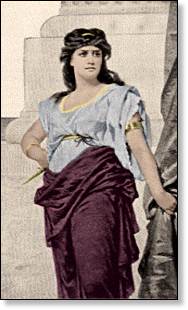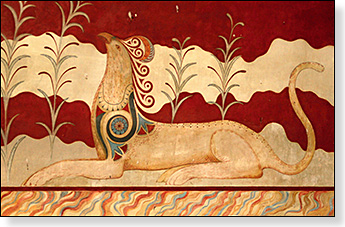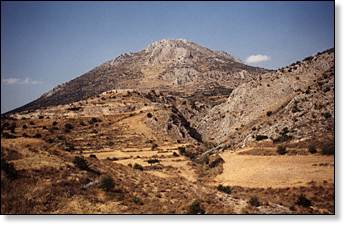Midas (MYE-das). Mythological possessor of the "Midas touch", the power to transmute whatever he touched into gold. Midas was a king of Phrygia, a region nowadays part of Turkey. One day some of his farmhands brought him a satyr they had caught napping in the vineyard. This creature, part man, part goat, still groggy and much the worse for wear, had been thoroughly trussed up to keep him from escaping. Midas immediately recognized Silenus, right-hand satyr to the god Dionysus, and ordered him set free.
 Silenus explained that he and his master had just returned from the East where they had been engaged in spreading the cultivation of the grape. Dionysus had brought back a tiger or two, an ever-expanding flock of followers and one very drunken satyr. Silenus had conked out in Midas's vineyard to sleep it off. Now he was grateful to the king for treating him with dignity, and so was Dionysus. The god was so pleased, in fact, that he offered to grant whatever Midas should wish for.
Silenus explained that he and his master had just returned from the East where they had been engaged in spreading the cultivation of the grape. Dionysus had brought back a tiger or two, an ever-expanding flock of followers and one very drunken satyr. Silenus had conked out in Midas's vineyard to sleep it off. Now he was grateful to the king for treating him with dignity, and so was Dionysus. The god was so pleased, in fact, that he offered to grant whatever Midas should wish for.
 Now, you didn't get to rule a kingdom in those days without a pretty active grasp of what makes for a successful economy. Midas didn't have to think twice. As the simplest plan for the constant replenishment of the royal treasury, he asked that everything he touch be turned to gold.
Now, you didn't get to rule a kingdom in those days without a pretty active grasp of what makes for a successful economy. Midas didn't have to think twice. As the simplest plan for the constant replenishment of the royal treasury, he asked that everything he touch be turned to gold.
 Arching a godly eyebrow, Dionysus went so far as to ask if Midas were sure. To which the king instantly replied, "Sure I'm sure." So Dionysus waved his pinebranch sceptre and conferred the boon.
Arching a godly eyebrow, Dionysus went so far as to ask if Midas were sure. To which the king instantly replied, "Sure I'm sure." So Dionysus waved his pinebranch sceptre and conferred the boon.
 And Midas rushed back home to try it out. Tentatively at first, he laid a trembling fingertip upon a bowl of fruit and then a stool and then a wooly lambkin. And when each of these had been transmuted in a trice into purest gold, the king began to caper about like the lambkin before its transformation.
And Midas rushed back home to try it out. Tentatively at first, he laid a trembling fingertip upon a bowl of fruit and then a stool and then a wooly lambkin. And when each of these had been transmuted in a trice into purest gold, the king began to caper about like the lambkin before its transformation.
 "Just look at this!" he crowed, turning his chariot into a glittering mass of priceless-though-worthless transportation. "Look what daddy can do!" he cried, taking his young daughter by the hand to lead her into the garden for a lesson in making dewy nature gleam with a monotonous but more valuable sheen.
"Just look at this!" he crowed, turning his chariot into a glittering mass of priceless-though-worthless transportation. "Look what daddy can do!" he cried, taking his young daughter by the hand to lead her into the garden for a lesson in making dewy nature gleam with a monotonous but more valuable sheen.
 Encountering unexpected resistance, he swung about to see why his daughter was being such a slug. Whereupon his eyes encountered, where late his child had been, a life-size golden statue that might have been entitled "Innocence Surprised".
Encountering unexpected resistance, he swung about to see why his daughter was being such a slug. Whereupon his eyes encountered, where late his child had been, a life-size golden statue that might have been entitled "Innocence Surprised".
 "Uh oh," said Midas, and from that point on the uh-oh's multiplied. He couldn't touch any useful object without it losing in utility what it gained in monetary value, nor any food without it shedding all nutritional potency on its leaden way down his gullet.
"Uh oh," said Midas, and from that point on the uh-oh's multiplied. He couldn't touch any useful object without it losing in utility what it gained in monetary value, nor any food without it shedding all nutritional potency on its leaden way down his gullet.
 In short, Midas came to understand why Dionysus had looked askance when asked to grant the favor. Fortunately, the god was a good sport about it. He allowed Midas to wash away his magic touch in the river Pactolus, which ever after enjoyed renown for its shimmering deposits of gold.
In short, Midas came to understand why Dionysus had looked askance when asked to grant the favor. Fortunately, the god was a good sport about it. He allowed Midas to wash away his magic touch in the river Pactolus, which ever after enjoyed renown for its shimmering deposits of gold.
|
| Minerva (mih-NER-vuh). Roman name of Athena, the Olympian goddess of crafts and the domestic arts and also those of war; patron goddess of Athens. Athena was born from Zeus's head and was originally the Great Goddess in the form of a bird. She aided the heroes Perseus, Jason, Cadmus and Heracles in their quests.
|
| | |







